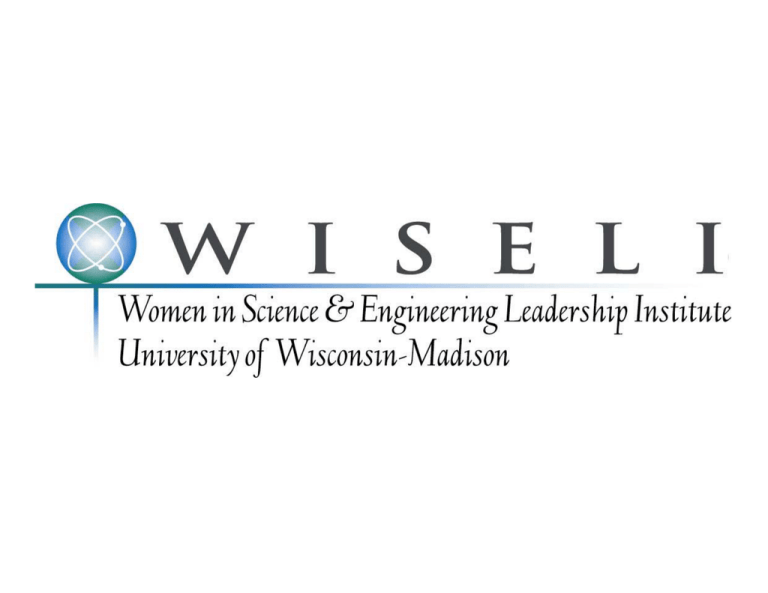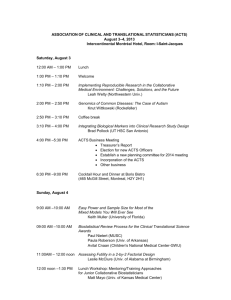Document 14199625
advertisement

More Women In Science: The Institutional Challenge More Women In Science The Problem Some Solutions ADVANCE Innovations Elements of ADVANCE Success The Problem 60 Percent Women Ph 50 40 Social Sciences Life Sciences 30 Physical Sciences 20 Engineering 10 0 74 9 1 77 9 1 80 9 1 83 9 1 86 9 1 89 9 1 Year 92 9 1 95 9 1 98 9 1 01 0 2 04 0 2 Percent Women The Problem 50% 45% 40% 35% 30% 25% 20% 15% 10% 5% 0% Life Sciences Physical Sciences Engineering Ph.D. Asst. Prof. Assoc. Prof. Full Prof. The Problem Women from minority racial and ethnic backgrounds are virtually absent from the nation’s leading science and engineering departments “Increasing the number of women earning science and engineering doctorates will have little effect on the number of women in academic positions, unless attention is paid to recruiting women to these positions and retaining them once hired.” Past Solutions Increasing the pipeline Increased funding for women POWRE awards? Teach women how to succeed Biology? Leadership training Mentoring Policy changes Extend tenure clock Dual career hire New Approach: Institutional Transformation Rules that appear neutral may function in a way that leads to differential treatment or produces differential outcomes for men and women Tenure process coincides with family formation years Outside activities (e.g., family obligations) indicate a “lack of seriousness” about career Use of programs designed to increase flexibility? Deviation or delay from “normal” path Salary increases/outside offers Childcare needs (conferences, field study, time in laboratory) “Academic organizational structures and rules contribute significantly to the underuse of women in academic science and engineering.” New Approach: Institutional Transformation National Science Foundation ADVANCE program 2001 first solicitation Large, prestigious awards Goal is to transform the institution, not the women! Take a scientific approach: data, social science research Provide models for other universities What is “climate?” The atmosphere or ambience of an organization as perceived by its members. An organization's climate is reflected in its structures, policies, and practices; the demographics of its membership; the attitudes and values of its members and leaders; and the quality of personal interactions. (UW-Madison, 2002). Work/Life Balance UW-Madison, Univ of Michigan, Univ of Washington, others: Life Cycle Grants Georgia Tech: Childcare, lactation spaces, Active Service/Modified Duties policy Virginia Tech: Dual Career Hiring program Univ of Alabama-Birmingham: Tenure clock extensions Iowa State Univ: Cost/benefit analysis of w/l policies Vilas Life Cycle Professorship Program Recognize that life events outside of one’s control happen Both men and women experience such events, but women are more likely to experience them early in the career, when they are more vulnerable Reduce turnover by providing research support for faculty in crisis Understand what events are problematic and which career junctures are most critical Understand what faculty need when they are in crisis Vilas Life Cycle Professorship Program Fall 2002 – Spring 2004, Pilot Program Fall 2004, Bridge Funding Four rounds, 17 Applicants, 7 Awards ADVANCE funding supplemented by Graduate School One round, 5 Applicants, 3 Awards Graduate School and Provost Office funding Spring 2005 +, Vilas Life Cycle Professorships Three rounds/year, 27 Applicants, 18 Awards Vilas Trust funding, $372,000 per year Vilas Life Cycle Professorship Program Applicants Awardees Vilas Life Cycle Professorship Program Applicants Awardees Vilas Life Cycle Professorship Program Applicants Awardees What is “climate?” The atmosphere or ambience of an organization as perceived by its members. An organization's climate is reflected in its structures, policies, and practices; the demographics of its membership; the attitudes and values of its members and leaders; and the quality of personal interactions. (UW-Madison, 2002). Recruiting & Hiring Hiring process is an obvious critical juncture Entry point to the faculty Determines the “complexion” of faculty for decades Hiring processes vary enormously across departments, colleges, universities Faculty normally receive little or no training in running an effective hiring process Unconscious biases and assumptions can easily enter the evaluation of candidates Recruiting & Hiring UW-Madison: Searching for Excellence & Diversity workshops Univ of Michigan: STRIDE Univ of Washington: Hiring Toolkit Univ of Illinois-Chicago: SUCCEED Univ of California-Irvine: Equity Advisors New Mexico State Univ, Univ of Montana: Supplement startup and/or salary for women hires Searching for Excellence & Diversity Five Essential Elements of a Successful Search Run an effective and efficient search committee Actively recruit an excellent and diverse pool of candidates Raise awareness of unconscious assumptions and their influence on evaluation of candidates Ensure a fair and thorough review of candidates Develop and implement an effective interview process Unconscious Biases and Assumptions An impressive body of controlled experimental studies and examination of decision-making process in real life show that: On the average, people are less likely to hire a woman than a man with identical qualifications People are less likely to ascribe credit to a woman than to a man for identical accomplishments When information or time is scarce, people will far more often give the benefit of the doubt to a man than to a woman What is “climate?” The atmosphere or ambience of an organization as perceived by its members. An organization's climate is reflected in its structures, policies, and practices; the demographics of its membership; the attitudes and values of its members and leaders; and the quality of personal interactions. (UW-Madison, 2002). Departmental Climate “Chilly climate” for women in academic departments is a recurring theme in much of the literature Climate surveys continually document the differences in men and women faculty’s perceptions of their work environments Climate often cited by women as a reason for leaving a university, or academia Departmental Climate UW-Madison: Enhancing Department Climate: A Chair’s Role workshops Univ of Washington: Department head professional development workshops Case Western Reserve Univ: Coaching for department chairs Univ of Michigan, Utah State Univ: Interaerctive theater program Univ of Rhode Island: Climate grants for departments Univ of Michigan: STEP program Enhancing Department Climate: A Chair’s Role Individuals experience climate in their immediate workplace – the department Chairs can significantly influence womens’ experiences in their departments Chairs’ perspectives of climate differ from those of other faculty, especially women faculty % Agree Strongly or Somewhat Figure 1. The climate for women in my department is good 100.0% * 80.0% 60.0% * 40.0% 20.0% 0.0% Women Faculty Men Faculty Dept. Chairs Departments Resurveyed Mean 1st Survey N Mean 2nd Survey N Change Department A 3.21 24 3.71 56 0.5 Department B 3.07 15 3.29 17 0.22 Department C 3.82 60 4.25 53 0.43 Department D 3.79 124 3.63 86 -0.16 Overall Mean Score 3.47 3.72 0.25 Percent Agree: The Climate for Women In My Department is Good 100.0% 80.0% 60.0% 2003 2006 40.0% 20.0% Women in g g at ar t ic ip N N on -P -P on Pa rt ic in at ic ip ar t rt ic Pa ip at in g g at in ip at N on -P Pa rt ic ar t ic ip ip at in in g g 0.0% Men Chairs What else? Data! NSF indicators Climate surveys Evaluation data Interviews, focus groups Percent Women Faculty, by Division Percent Women Faculty University of Wisconsin-Madison 25.0% 20.0% 15.0% 10.0% 5.0% 2000 2001 2002 2003 2004 2005 2006 Physical Sciences Biological Sciences % Female, Major UW-Madison Faculty Awards* Biological & Physical Sciences 40% 30% 20% 10% 0% 2000 2001 2002 * Vilas Associate, Hilldale, Romnes, Kellett 2003 2004 2005 2006 Women as Percentage of Named Professorship Recipients 20% % Women 15% 10% 5% 0% 2000 2001 2002 2003 2004 2005 2006 % Women Department Chairs Biological & Physical Sciences 25.0% 20.0% 15.0% 10.0% 5.0% 0.0% 2000 2001 2002 2003 2004 2005 2006 2007 Women as Percentage of New Hires Biological and Physical Sciences % Women Hires 50% 40% 30% 20% 10% 0% 99-00 01-02 00-01 03-04 02-03 Untenured 05-06 04-05 Tenured 07-08 06-07 Total Climate for Women and Faculty of Color Any WISELI Participation % Agree Strongly or Somewhat 100.0% 80.0% 60.0% * 40.0% 20.0% 0.0% Climate for Women is Good Climate for Faculty of Color is Good 2003 2006 Life Cycle Grant evaluation “[With other grants] you're competing on a national level on everything, and I think that's fair, but you are at a disadvantage because you just don't have the time and energy at the same level as perhaps other people and so it just gives you that little bit of, little extra money to get things pulled together– have another person, have more reagents, have more whatever you need to have your grant be competitive. I also think it's a good idea because of the investment value. If I get my grant, it's going to pay off for the university several fold over.” Importance of department chair Before I got here, when [X] was chair, two other people had babies under his leadership and [it] was fine! ‘Oh! Congratulations! Good. Take the semester off. You have a grad student to fill in. Okay, that’s no problem.’ Blah blah blah. And it was, you know, a handshake and a nod and, ‘Of course . . . do what you need to do. Let me know when you can get back on your feet’-type thing. Versus [the new] chair has never had kids, does not think the idea of parental leave is meritorious. ADVANCE Elements of Success Support of high-level administrators Resources Peer-to-peer interactions Use of data (both qualitative & quantitative) Use of literature on unconscious bias and assumptions Active learning strategies Fearless intervention when required Refrain from gender-specific programming

